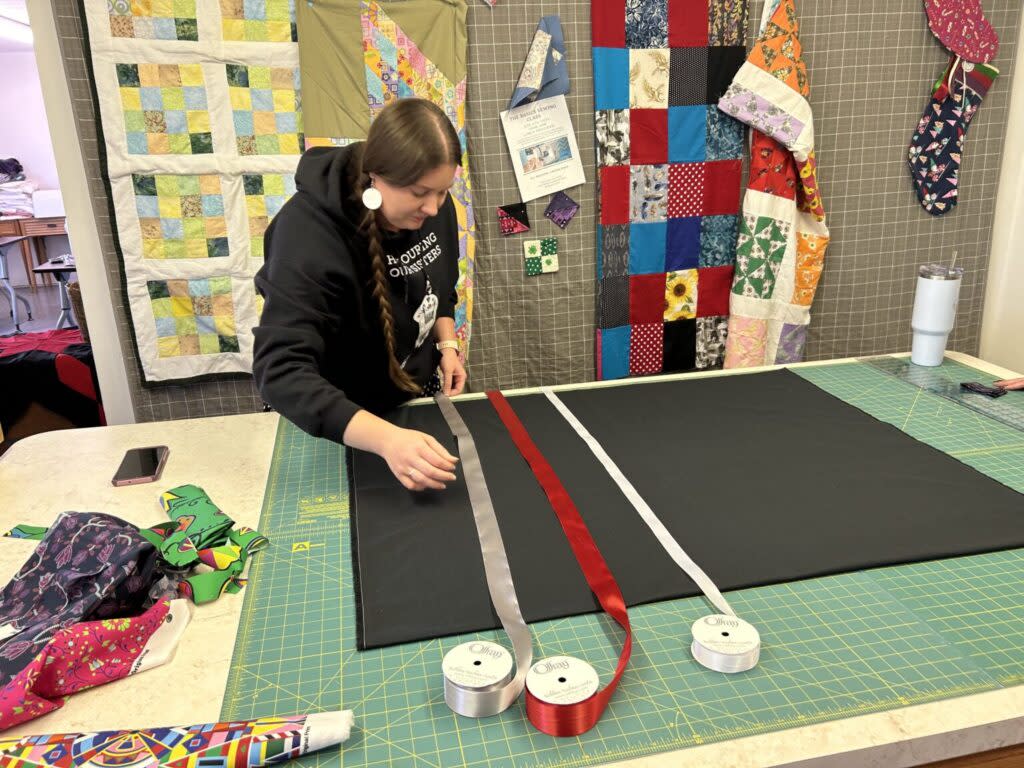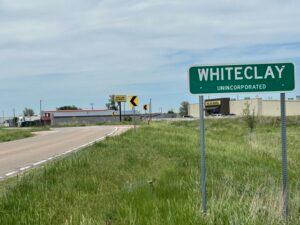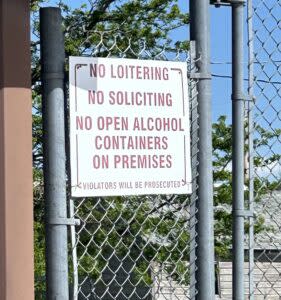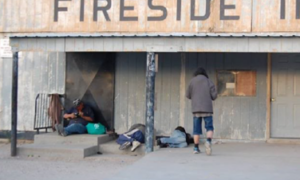Makerspace, new businesses bring hope for former ‘Skid Row of the Plains’

Jessi Bean strings ribbons on a “ribbon skirt” she is working on at the Whiteclay Makerspace, located in a renovated beer store in Whiteclay. (Paul Hammel/Nebraska Examiner)
WHITECLAY, Nebraska — Art has replaced alcohol at one of the once-notorious buildings in this dusty village on the Nebraska-South Dakota border.
In the back room of the former Arrowhead beer store, Jessi Bean spreads out colorful fabric on a broad table as she works to make an ornate Native American “ribbon dress.”
The brightly lit workspace is part of the Whiteclay Makerspace, which converted the old liquor store into an area where local artisans can produce homemade crafts using the space’s specialized equipment and supplies.
Star quilts, ribbon dresses
In one room, huge quilting machines and sewing machines are used to produce prized “star quilts” and ribbon dresses. In another room, a machine can use photographs to duplicate the image on T-shirts. Tools to make leather goods or do woodworking are also available.
The Makerspace has an in-house supply store, so crafters can obtain fabric, beads and ribbons without the 90-minute drive to Rapid City, South Dakota, or an hour’s trip to Chadron, Nebraska. There’s a retail store out front where visitors can purchase goods produced at the building.
The goal is to give artisans a place to produce sellable goods to supplement their income or establish a business.

But the founder of the Makerspace said it has also helped to turn around the image of Whiteclay, which, before the four beer-only liquor stores were closed in 2017, was inhabited by street people who openly drank, urinated and defecated along the highway that runs through town to the Oglala Sioux reservation, just across the border to the north.
Back then, Whiteclay was blamed for contributing to the rampant alcoholism and alcohol-related problems on the Pine Ridge Reservation, where sales and possession of alcohol are officially banned and where poverty levels are at or near a national high.
“There’s a lot of people who feel the old Whiteclay is in the back of their minds now. And that’s not a bad thing,” said Jon Ruybalid, a Nebraska-based entrepreneur who converted the old liquor store into the Makerspace.
Dramatic change
Dramatic changes were evident on a recent visit to the unincorporated village, which has a cluster of businesses and a couple of homes along Nebraska Highway 87, in the far northwest corner of Nebraska near the scenic Pine Ridge.
There are now two discount stores in town, a Dollar General and a Family Dollar, along with a new tax preparation business. A steady stream of traffic pulls into two long-running stores, the Whiteclay Grocery and Abe’s General Store. And up the highway, the tribal-owned Oglala Sioux Lakota Nursing Home has expanded, adding a 12-bed memory care wing a couple of years ago.
Gone are the dozen or more intoxicated people who lay against buildings, drank cans of high-alcohol beer and harassed and panhandled shoppers. Also gone are the piles of beer cans and trash and the smell of urine on the street.
Once called “The Skid Row of the Plains,” there’s a new attitude in Whiteclay.
“It’s been a big change,” said Alberta Miller, who drove from Porcupine, South Dakota, to shop at the grocery store. “There’s more business. People feel safe.”
Sheridan County Sheriff Jeff Brewer said calls for service in Whiteclay are way down, allowing local deputies to better patrol other roads in the rural ranching area.
Not the ‘highway of death’
Predictions that closing the Whiteclay beer stores would just shift the street people, beer purchases and alcohol problems to Rushville, 23 miles to the south — leading to a surge in drunken driving accidents — haven’t come true, Brewer said.

During his five years as sheriff, he said, there have been two fatality accidents along Highway 87, and one was due to a sober motorist not seeing a pedestrian wearing dark clothing on the roadway. It was unclear if the other fatality was alcohol related, he said.
“It’s not the highway of death that they said it was going to be,” said Brewer, who worked several decades with the Gordon Police Department before becoming sheriff.
Instead, the rural county is saving some money, he said, because they get fewer calls for disturbances at Whiteclay, along with fewer cases to prosecute and fewer people to jail.
“There was a lot of money put into that,” Brewer said. “To me, the benefit was to a handful of people who were making money, and the rest of us were paying for it.”
Still in the plans for Whiteclay is a wellness center proposed two years ago by a tribal entity, the Thunder Valley Community Development Corp.
Some problems have shifted
Despite the closing of the Whiteclay beer stores, substance-abuse problems on the reservation — whose residents bought up to 4 million cans of beer a year in Whiteclay — persist, those interviewed said.
Some of the problems have shifted.
Instead of high-alcohol content beer from Whiteclay, bootleggers are selling vodka in plastic bottles. There are stories of rubbing alcohol or hand sanitizer being mixed in, too.
Drugs, particularly methamphetamines, have increased as a problem, according to Brewer, and his deputies are encountering more guns during traffic stops, as well as high-speed pursuits.
Representatives of the Oglala Sioux Tribal Council did not respond to phone messages left in recent days, nor did representatives of the tribal police department, which is seeking a new chief.
But at least two members of the tribe said the street people once visible in Whiteclay can now be found in Pine Ridge, the reservation city just two miles across the border, or in Rapid City.
Cast a different light
Meanwhile, at the Whiteclay Makerspace, Jessi Bean sings the praises of having a large, well-equipped facility to pursue her sewing. A teacher at a tribal school, Bean said the summer allows her more time to make ribbon skirts, and she jokes that her students give her a hard time if she’s not wearing one.
“It’s nice to have a place where you can come together as a community and collaborate,” Bean said, adding that she’s learned a thing or two from others working at the makerspace.
Nearby, Jack Conroy, a former North Dakota oil field worker, sews a bag to carry pieces used in a Native American sport called “Handgame.” It’s a guessing game, he said, that sometimes involves gambling and sometimes spawns expensive tournaments.
Conroy also runs a marijuana dispensary in Porcupine. Four years ago, tribal members voted to legalize recreational marijuana, although the reservation remains “dry” concerning alcohol.
He said the makerspace has helped cast “a different light” on Whiteclay.

Holly Albers, who manages the facility, said the goal is to allow tribal and non-tribal members from the area to expand their crafts and make some extra money, and, in some cases, help them create a business.
Many tribal members, Albers said, live paycheck to paycheck, so the extra money from making leather goods, star quilts or artwork helps.
“This isn’t so much about professional artists but for crafters, to make their money back,” she said.
State support lacking
It costs $3 a day to use the makerspace, or $20 a month, and the program posts some of the goods produced on the internet to help market them. The facility also conducts workshops on making products and managing bank accounts.
“Believe. Dream. Imagine.” says a sign on the wall.
Ruybalid said the COVID-19 pandemic, which caused the nearby tribe to post guards at the reservation’s borders, pushed back progress at the makerspace, but now, he said, “we’re just about to hit our stride.”
He said he was able to purchase and convert the old liquor store with the help of a U.S. Department of Agriculture community development grant, as well as getting financial and volunteer support from Rotary clubs in nearby Hot Springs, South Dakota, and Rapid City.
He lamented that not as much support as expected has come from the State of Nebraska.
“I can’t say that Nebraska has rallied behind us, which would be encouraging, because we got rid of a black eye,” Ruybalid said. “Now we have an opportunity to make it thrive.”
GET THE MORNING HEADLINES DELIVERED TO YOUR INBOX SUPPORT NEWS YOU TRUST.
The post Makerspace, new businesses bring hope for former ‘Skid Row of the Plains’ appeared first on South Dakota Searchlight.

